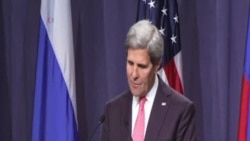GENEVA —
The United States and Russia have agreed on a framework for ending Syria's chemical-weapons program.
The agreement was announced by U.S. Secretary of State John Kerry and Russia Foreign Minister Sergei Lavrov on Saturday as they wrapped up talks in Geneva.
The plan requires Syria to make a full declaration within a week listing all of its chemical-weapons storage and production sites. It calls for the destruction of chemical arms production and mixing equipment by November and the elimination or removal from Syria of all chemical-weapons material and equipment by the middle of 2014.
U.S. and Russian officials agreed to push for a U.N. resolution enforcing the plan without threatening military action.
Kerry said if Syria does not comply with the agreement, the U.S. could request a U.N. Security Council "Chapter 7" resolution, which authorizes punitive action.
Lavrov said the deal does not include anything about potential use of force.
Lavrov, who disputes President Assad's responsibility for last month's attack, says the deal holds Syrian rebels to the same standards.
Plan could avert US military strike
During the three days of talks, U.S. and Russian officials agreed that Syria currently holds about 1,000 metric tons of chemical agents and precursors including sulfur mustard and sarin gas.
U.S. officials believe there are about 45 storage sites holding those munitions and related equipment, but they also say Syrian President Bashar al-Assad's regime may have shifted the location of parts of its arsenal.
Story continues below photo gallery:
Syrian compliance with the agreement could avert a U.S. military strike in retaliation for the Syrian government's alleged poison-gas attack on civilians last month near Damascus.
The United States says more than 1,400 people died in the attack, and that it has conclusive evidence showing the Syrian regime was responsible. The Assad government contends rebels carried out the attack.
U.S. President Barack Obama welcomed the framework agreement with Russia, calling it "an important, concrete step." But, he added, there is much more work to be done.
In a statement Saturday, Obama said the U.S. will continue working with its allies and Russia to ensure there is a verifiable process of identifying and dismantling Syria's stockpile of banned weapons, and that there will be consequences if Assad's government does not comply.
Mixed reactions
U.N. Secretary-General Ban Ki-moon said he is looking forward to learning more about the framework agreement, and pledged the support of the United Nations in its implementation. Ban said he hopes the agreement will prevent any further use of chemical weapons in Syria, and that it can help pave the path for a political solution to the civil war and "stop the appalling suffering inflicted on the Syrian people" since 2011.
France and Britain hailed the agreement Saturday. French Foreign Minister Laurent Fabius and British Foreign Secretary William Hague will meet in Paris with Secretary of State Kerry on Monday to discuss the agreement in detail.
European Union foreign-policy chief Catherine Ashton said a number of EU states have the technical capacity to assist in securing and dismantling chemical weapons sites in Syria.
German Chancellor Angela Merkel said thanks to the deal between the United States and Russia, there is a chance once more for a political solution to the Syrian crisis.
The head of the rebel Free Syrian Army said his group rejects the deal reached in Geneva, and believes Russia and the Syrian regime were merely "playing games to waste time." Speaking to reporters in Istanbul, General Selim Idriss said his forces will continue fighting against Assad's government.
Syria's main Western-backed opposition group, the Syrian National Coalition (SNC), elected longtime political activist Ahmad Tumeh its new prime minister as it seeks to boost its standing as a credible political alternative in the civil war-stricken country.
SNC members have previously dismissed prior diplomatic efforts to address Syria's chemical weapons and said the plan gives the Syrian army free rein to fight on with conventional weapons.
In Washington, two prominent Republican senators had a sharply critical initial reaction to the Kerry-Lavrov plan. They predicted it would turn out to be "meaningless" unless it explicitly raises the possibility of the use of military force against Syria. In a joint statement, Senators John McCain and Lindsey Graham characterized the deal as "an act of provocative weakness" on America's part.
The two senators said the agreement does not resolve Syria's "real problem" — the civil conflict that has resulted in over 100,000 deaths.
UN investigation
A long-awaited United Nations report on Syria's alleged chemical weapons attack on civilians in August is due out Monday. Secretary-General Ban Ki-Moon has said the findings, based in site visits, boxes of evidence and eye witness accounts, "will be an overwhelming report that the chemical weapons was used."
VIDEO: World Awaits UN Findings on Syrian Chemical Weapons
Kent Klein at the White House, Margaret Besheer at the United Nations, Edward Yeranian in Cairo and Pam Dockins in Washington contributed to this report. Some information for this report was provided by AP, AFP and Reuters.
The agreement was announced by U.S. Secretary of State John Kerry and Russia Foreign Minister Sergei Lavrov on Saturday as they wrapped up talks in Geneva.
The plan requires Syria to make a full declaration within a week listing all of its chemical-weapons storage and production sites. It calls for the destruction of chemical arms production and mixing equipment by November and the elimination or removal from Syria of all chemical-weapons material and equipment by the middle of 2014.
U.S. and Russian officials agreed to push for a U.N. resolution enforcing the plan without threatening military action.
A Look at Key Points of US-Russia Plan for Syria
Key points of US-Russian proposal for eliminating Syria's chemical weapons- A full declaration from Syria of chemical weapons storage and production sites in one week
- Initial on-site inspections of sites by November
- Destruction of chemical mixing, production and filling equipment by November
- Elimination or removal of chemical weapons material and equipment by mid-2014
- Syrian violations could prompt U.N. Security Council action
Lavrov said the deal does not include anything about potential use of force.
Lavrov, who disputes President Assad's responsibility for last month's attack, says the deal holds Syrian rebels to the same standards.
Plan could avert US military strike
During the three days of talks, U.S. and Russian officials agreed that Syria currently holds about 1,000 metric tons of chemical agents and precursors including sulfur mustard and sarin gas.
U.S. officials believe there are about 45 storage sites holding those munitions and related equipment, but they also say Syrian President Bashar al-Assad's regime may have shifted the location of parts of its arsenal.
Story continues below photo gallery:
Syrian compliance with the agreement could avert a U.S. military strike in retaliation for the Syrian government's alleged poison-gas attack on civilians last month near Damascus.
The United States says more than 1,400 people died in the attack, and that it has conclusive evidence showing the Syrian regime was responsible. The Assad government contends rebels carried out the attack.
U.S. President Barack Obama welcomed the framework agreement with Russia, calling it "an important, concrete step." But, he added, there is much more work to be done.
In a statement Saturday, Obama said the U.S. will continue working with its allies and Russia to ensure there is a verifiable process of identifying and dismantling Syria's stockpile of banned weapons, and that there will be consequences if Assad's government does not comply.
Mixed reactions
U.N. Secretary-General Ban Ki-moon said he is looking forward to learning more about the framework agreement, and pledged the support of the United Nations in its implementation. Ban said he hopes the agreement will prevent any further use of chemical weapons in Syria, and that it can help pave the path for a political solution to the civil war and "stop the appalling suffering inflicted on the Syrian people" since 2011.
France and Britain hailed the agreement Saturday. French Foreign Minister Laurent Fabius and British Foreign Secretary William Hague will meet in Paris with Secretary of State Kerry on Monday to discuss the agreement in detail.
European Union foreign-policy chief Catherine Ashton said a number of EU states have the technical capacity to assist in securing and dismantling chemical weapons sites in Syria.
German Chancellor Angela Merkel said thanks to the deal between the United States and Russia, there is a chance once more for a political solution to the Syrian crisis.
The head of the rebel Free Syrian Army said his group rejects the deal reached in Geneva, and believes Russia and the Syrian regime were merely "playing games to waste time." Speaking to reporters in Istanbul, General Selim Idriss said his forces will continue fighting against Assad's government.
Syria's main Western-backed opposition group, the Syrian National Coalition (SNC), elected longtime political activist Ahmad Tumeh its new prime minister as it seeks to boost its standing as a credible political alternative in the civil war-stricken country.
SNC members have previously dismissed prior diplomatic efforts to address Syria's chemical weapons and said the plan gives the Syrian army free rein to fight on with conventional weapons.
In Washington, two prominent Republican senators had a sharply critical initial reaction to the Kerry-Lavrov plan. They predicted it would turn out to be "meaningless" unless it explicitly raises the possibility of the use of military force against Syria. In a joint statement, Senators John McCain and Lindsey Graham characterized the deal as "an act of provocative weakness" on America's part.
The two senators said the agreement does not resolve Syria's "real problem" — the civil conflict that has resulted in over 100,000 deaths.
UN investigation
A long-awaited United Nations report on Syria's alleged chemical weapons attack on civilians in August is due out Monday. Secretary-General Ban Ki-Moon has said the findings, based in site visits, boxes of evidence and eye witness accounts, "will be an overwhelming report that the chemical weapons was used."
VIDEO: World Awaits UN Findings on Syrian Chemical Weapons
Kent Klein at the White House, Margaret Besheer at the United Nations, Edward Yeranian in Cairo and Pam Dockins in Washington contributed to this report. Some information for this report was provided by AP, AFP and Reuters.
















